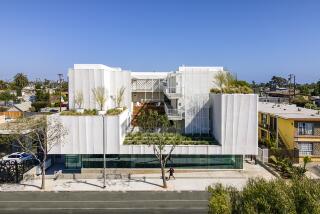Editorial: Yes, California has a housing crisis. But killing community planning isn’t how democracy should work
When residents of South Los Angeles began the decade-long process of updating their official “community plan” — the blueprint that guides building, development and land use in city neighborhoods — they had some specific goals. They wanted to attract grocery stores, sit-down restaurants, banks and other basic commercial services that were missing in their neighborhoods. And as the building boom downtown moved south and as work began on the Crenshaw Line light rail, many long-time renters also wanted some measure of protection so the wave of new development wouldn’t price them out.
The two new community plans they produced last year — one for South L.A. and one for Southeast L.A. — were a model of equity-focused, neighborhood-led planning. The plans offer developers incentives, such as greater height, more square footage or reduced parking requirements, for projects that include a food store, restaurant or bank. Developers can also build significantly larger apartment buildings near transit stops if they include lots of units reserved for low-income tenants. The idea was to use zoning and land-use laws to encourage economic development without displacement.
Overruling local control ultimately means ignoring local voices.
But now, a decade’s worth of local activism and community engagement could be made worthless. That’s because of Senate Bill 827 — Sen. Scott Wiener’s (D-San Francisco) radically ambitious proposal that, in the righteous pursuit of ending California’s housing crisis, would override local zoning laws to allow developers to build taller, bigger apartments and condo projects near rail stations and bus stops.
SB 827 would loosen or eliminate local restrictions on height, density, parking and design for residential properties within a half-mile of public transit. It would allow buildings ranging from four to eight stories tall in neighborhoods zoned for single-family houses.
The goal of SB 827 is unquestionably worthy. California’s record-high rents and surging homeless population are the results, in great part, of a failure to build enough housing over the last few decades. The state needs to build 3.5 million more units by 2025 to meet population and market demands, according to the McKinsey Global Institute, a private think tank. And because the state has committed to slashing greenhouse gas emissions to help slow climate change, it makes sense to build those new units near transit so people can get around without polluting cars.
Wiener argues that cities and counties have used zoning and land-use laws to squelch new development — and that’s why the state has a housing shortage. He’s right. Residents and elected officials across the state have too often acted on their worst NIMBY instincts to block or restrict housing in the name of preventing traffic and density and protecting neighborhood character. According to Wiener, Sacramento must now step in because cities have failed to step up, to ensure that new residents — and not just those already residing in a particular neighborhood — have a chance to live in affordable, transit-adjacent housing.
Wiener is right that previous efforts to encourage localities to meet their own housing goals have fallen short — and that his audacious proposal will spark a discussion worth having. It already has.
And yet, while SB 827 might make sense at the macro level, it raises significant concerns at the micro level. The bill as currently written would upzone vast swaths of Los Angeles. Just look at South L.A. The bill would override zoning in roughly 98% of the South L.A. plan area and 96% of the Southeast L.A. plan area. Virtually all of the new incentives to encourage the development of grocery stores, banks and other amenities would be erased because the bill would give those same height increases and parking reductions for free. The hard work by residents, activists and city planners drafting land-use laws that serve the broader goals of the community would be overruled by Sacramento.
Those South L.A. communities — which are largely low-income and minority — would lose virtually all ability to influence or shape the development of their neighborhoods. That’s the problem. Overruling local control ultimately means ignoring local voices. It robs residents and business owners of the right to shape their communities, and it assumes that local residents and officials can’t be trusted to make decisions for the greater good. It undermines participation in local government, and that can have a corrosive effect on civic engagement. Why bother showing up to a meeting about your city’s General Plan update? Why should you vote in the next City Council election if your voice and choices are ultimately overruled by Sacramento?
(Wiener, acknowledging some of the criticisms of his bill, has said he is considering removing less frequently served bus stops from the bill, which would mean that many fewer streets would be covered. That would certainly make the bill less sweeping, although it would still override local zoning.)
Rather than strip away local control completely, the state should first tighten and enforce existing state laws that require communities to plan more compact, transit-friendly growth and to permit enough housing to meet population increases.
In fact, the Legislature passed a smart bill by Wiener last year along those lines. Senate Bill 35 put teeth in the state’s existing “fair share” housing law that requires cities to plan for enough market-rate and affordable housing. SB 35, which is now in effect, requires cities that have fallen behind on their housing construction goals to streamline the approval of certain apartment or condo projects. The beauty of SB 35 was that it didn’t override cities’ local zoning and land-use laws; it simply required them to follow those laws and permit housing. The bill already appears to be working. The developer of a long-stalled project in Cupertino recently filed an application to build 2,400 units, half of which would be set aside as affordable.
Wiener has said SB 827 is a work in progress and that he’s open to amendments. We’re hopeful lawmakers can find a way to use the power of the state to pressure, cajole or even demand that cities allow more housing near transit, but still allow communities a meaningful voice in the process.
Follow the Opinion section on Twitter @latimesopinion and Facebook
More to Read
A cure for the common opinion
Get thought-provoking perspectives with our weekly newsletter.
You may occasionally receive promotional content from the Los Angeles Times.










